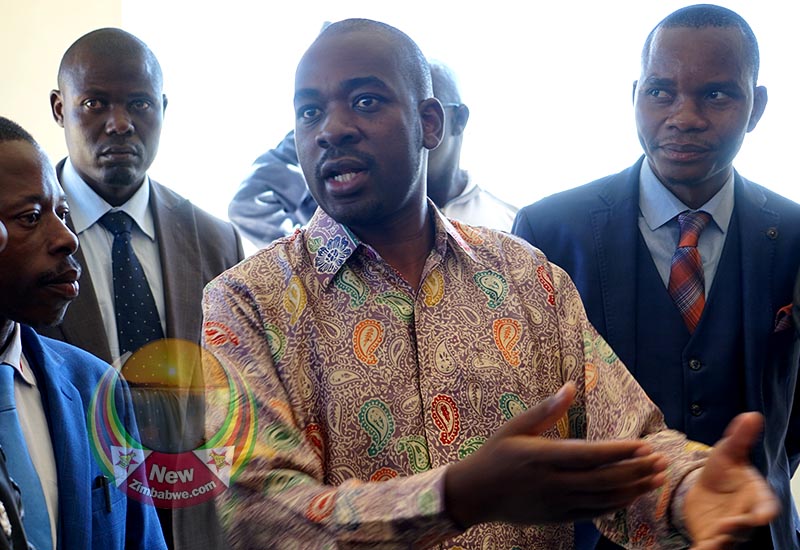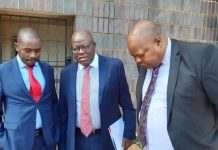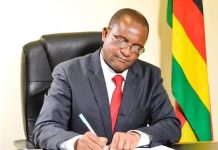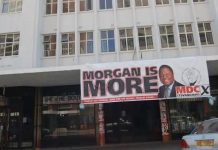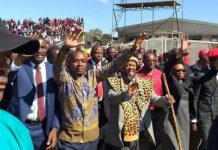THAT Zimbabwe’s socio-economic and political environment continues to worsen is undeniable. The question is how can Zimbabwe salvage herself from the abyss and forestall her implosion?
The standoff between the major political actors, President Emmerson Mnangagwa and opposition MDC Alliance leader Nelson Chamisa, has culminated in economic and political stagnation, as the two protagonists continue to pull in different directions. It would be a political blooper for both leaders to fail to design a modus vivendi that neutralises the socio-economic-political toxicity obtaining in Zimbabwe.
For policy programmes to succeed, both political and economic, there should at least be the restoration of trust between the governed and the governing.
The antagonism that exists between the State and its people is unhealthy for national development.
Drawing lessons from what was done by the likes of Joshua Nkomo, Robert Mugabe and Morgan Tsvangirai in line with bringing peace to Zimbabwe, I do not think it is impossible for Mnangagwa and Chamisa to sit down and discuss the sticking issues.
For Zimbabwe to be where it is today, many agreements were signed. These include the Lancaster House Agreement (1979), featuring the Patriotic Front (Zapu and Zanu), Zimbabwe Rhodesian government and the British government. The Unity Accord (1987) signed between Zanu PF and PF Zapu, Agreement on Amendment 18 and reforms on the Electoral Act (2007), signed between Zanu PF and two MDC formations.
The Global Political Agreement (2009), signed by Zanu PF and two MDC formations. This past must guide our thought processes concerning finding a common ground as Zimbabweans to solve the current problems.
The time has come to think about what we can do to work together as a family. Zimbabweans like other Africans are not by nature individualistic. We subscribe to communalism.
Let me briefly state my thesis on what are the three major challenges to governance in Zimbabwe:
l The creation of a social, political and economic order that is developmental in the sense that it mobilises and manages its material, financial and human resources to achieve high rates of growth and structural change;
l Ensuring that such a developmental order is democratic and respects human rights of all citizens; and
l Ensuring that such a developmental and political order is socially inclusive.
These three challenges must be pursued simultaneously. The challenges have come about by considering various sources: the reading of Zimbabwe’s history, the pronouncements by the political elite and social movements, and the current discourse on development.
If one were to extract something common from manifestos of Zanu PF and MDC Alliance, it would be the quest for a social order that addresses the serious problems of poverty, unemployment, low industrial capacity, democratic consolidation and a more equitable distribution of wealth. Why not working together to deliver what is contained in these manifestos? This will resultantly promote effective governance: developmental, democratic and socially inclusive social order. The question now is: do the agendas and practices of different political, economic and social actors in Zimbabwe today point to the possibility of such a state order?
Whether Zimbabwe succeeds or not depends on, to a large extent, the co-operation and the enthusiasm which the leaders generate among themselves and among fellow citizens. The current political party wrangles resulting in mutual hatred, disunity, confusion and despondency are not an asset to deliver the desired socio-economic transformation. Failing to work together is a high-risk game.
There is need for a broad national vision owned by every Zimbabwean. In the absence of clear national vision, there is a tendency to disagree and to do this in a hyper-acrimonious and highly personalised fashion: who paid what for whose funeral? This creates disillusionment and cynicism in ordinary people.
The general concern of the opposition parties appears to be getting into the shoes of Zanu PF so that they distribute political goods and services through patronage, corruption and favouritism. MDC Alliance should not concentrate only on discrediting the government, resulting in all kinds of indiscipline, immorality and even crime.
How can Mnangagwa lead a democratic government when this kind of ill-will, lies and misinformation are used to confuse ordinary Zimbabweans? Citizens should not take our pluralism for granted to the extent that they undermine national unity. Freedoms should not be manipulated to create divisions and hatred in our country.
Why working together?
l Domestic macro-economic framework is distorted, that is, it reduces the efficiency of resource use;
l International environment remains hostile, that is, it reduces the supply of earned foreign currency, shortage of concessional capital, FDI might flock in;
l International relations can be mended and genuine re-engagement might begin; and
l Current environment constraints resource mobilisation.
The attainment of economic and socio-political objectives cannot be a reality without sustained peace. We need to apply the principle: “charity begins at home”, to get our house in order and attract the foreign aid we need to get ourselves out of the woods.
The best solution to our problems is for us to sit down and talk on a more sincere basis. This will be a first step towards finding a solution. How do we address the issue of leadership for economic development, not only among our political leaders, but also among non-political leaders, those in all walks of life and at all levels of leadership? Whatever the policy, unless peace and harmony are entrenched and find their way to the policy-making processes, it will remain rhetoric.
MDC Alliance realities
MDC Alliance is failing to win majority support. It is not trusted as much as Zanu-PF. Thus, MDC Alliance is not seen as a viable alternative to the dominant ruling party. From 2008 right through 2018 elections, the trust in MDC sharply declined.
This reversal of fortune provides an important lesson for both MDC and the Zimbabweans that infighting and increasing fractionalisation weakens organisational capacity at party level and State capacity at national level. Thus, peace and togetherness are important in national development.
Public dissatisfaction with Zanu PF’s policy performance does not necessarily translate into perceptions that MDC Alliance could do a better job. This is particularly so not only in Zimbabwe, but also in South Africa. By simply constantly criticising the ruling party rather than contributing to the country’s development, MDC Alliance is putting off its supporters. The MDC Alliance can do better if it highlights its policy platforms and gain citizen confidence in its plans and capabilities. MDC Alliance must accept its weaknesses, inter alia: personality politics, lack of internal democracy, intra-party conflicts, bad organisation and weak connection with the popular constituencies particularly the rural areas.
As a result, the country has suffered an international blackout with United States instituting an economic and political embargo in the name of the Zimbabwe Democratic Economic Recovery Act (Zidera). The Europeans also imposed sanctions on the Zimbabwean government.
As a matter of political logic, the MDC Alliance had no interest in seeing Mnangagwa engender an economic recovery. It hopes that a continued decline would drive voters into its arms and compel Mnangagwa to bring the MDC Alliance into government.
Tendai Biti is in record saying that the MDC Alliance had ways of ensuring that Mnangagwa “would not get a cent” towards economic recovery from the West. The “kudira jecha musadza” strategy (throwing spanners in the works) — meant making things hard economically by lobbying the sanctions and make citizens suffer. A hungry man is an angry man. This attitude is unhelpful to both MDC Alliance and Zimbabweans. The role of opposition political parties is not to destroy any Zanu PF socio-economic transformation strategy.

